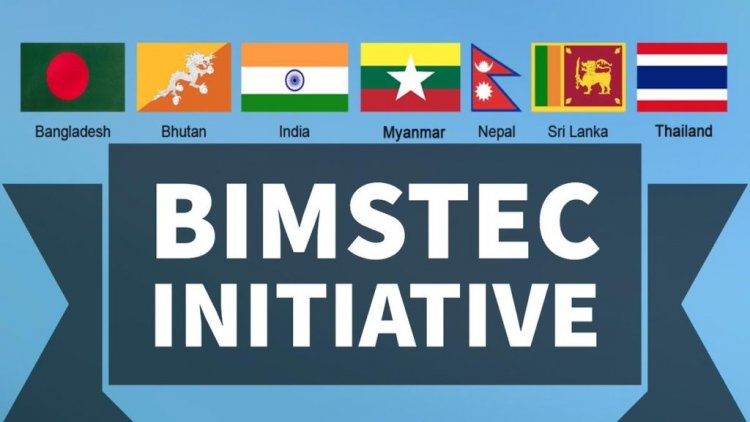BIMSTEC Summit: Key Takeaways
STORIES, ANALYSES, EXPERT VIEWS

India will be the “security pillar” of the BIMSTEC (Bay of Bengal Initiative for Multi-Sectoral Technical and Economic Cooperation), an official of the Ministry of External Affairs (MEA) said Wednesday at the conclusion of the grouping’s summit in Colombo.
Binstec comprises India, Bangladesh, Bhutan, Myanmar, Nepal, Sri Lanka and Thailand.
Unveiling of the Charter
Addressing the meeting virtually, Prime Minister Narendra Modi called for strengthening the BIMSTEC and welcomed the unveiling of the Charter of the organisation that connects the littoral countries of the Bay of Bengal. “This is an important step towards creating an institutional architecture of BIMSTEC,” he said. The Charter had given the BIMSTEC a new orientation and concrete goals. Under this Charter, the members were expected to meet once in every two years.
With the Charter, the MEA said the “BIMSTEC now has an international personality. It has an emblem, it has a flag. It has a formally listed purpose and principles that it is going to adhere to. It represents significant evolution of the grouping. From our perspective signing of the Charter was the most important outcome.”
In line with the development of the organisation into a formal structure, the leaders of the member-countries have agreed to divide the working of the grouping into seven segments, with India providing leadership to the “security pillar".
Emphasis on regional cooperation
Emphasising regional cooperation, Prime Minister Narendra Modi said developments in Europe of the last few weeks, “have raised a question mark on the stability of the international order. In this context, it has become important to make Bimstec regional cooperation more active. It has also become imperative to give more priority to our regional security.” He added: “Today, as our region faces challenges of health and economic security, the need of the hour is solidarity and cooperation. Today is the time to make the Bay of Bengal a Bridge of Connectivity, Bridge of Prosperity, Bridge of Security. Rededicate yourself with a new vigour, new energy.”
On security
On security, PM Modi said: “Without security it is impossible to ensure the prosperity or development of our region. In our fourth summit in Kathmandu, we decided to strengthen the regional legal framework against terrorism, trans-national crime and non-traditional threats. We also decided to increase cooperation between our law enforcement agencies. I am glad that our convention to combat terrorism has become active since last year. During today’s summit, a mutual legal assistance treaty on criminal matters is also being signed between us. We should also move quickly to other similar instruments, so there can be better coordination between our legal systems.”
Push for closer Bimstec links for stability in region
These remarks , in particular questions relating to stability of the international order because of the Ukraine crisis, and the consequent need for regional cooperation, are seen by observers as an important move to counter China’s influence in the region. Bimstec’s membership is for nations that are ‘littoral’ to or ‘dependent’ on the Bay of Bengal. With Saarc in cold storage due to India-Pakistan tensions in earlier years, India has invested its hopes for regional cooperation in Bimstec, which does not have Pakistan as a member.
At a special briefing Wednesday afternoon in New Delhi following the summit, the external affairs ministry’s additional secretary in charge of Bimstec, Rudrendra Tandon, said with the adoption of the charter by the leaders, Bimstec had been formalised into a ‘regional organisation’ with its ‘purpose, principles and architecture’ and now had an ‘international personality’ with its own ‘emblem and flag’.
On Bimstec Free Trade Agreement
Significantly, PM Modi spoke about the proposal for a Bimstec Free Trade Agreement (FTA): “It is necessary to make early progress on the proposal of Bimstec FTA to enhance our mutual business. We should also increase exchanges between the entrepreneurs and start-ups of our countries. Along with this, we should also try to adopt international norms in the field of trade facilitation. This will boost intra-Bimstec trade and economic integration”.
Speaking later, external affairs ministry’s additional secretary in charge of Bimstec, Rudrendra Tandon, said the trade facilitation efforts were a ‘low-hanging fruit’ or ‘early harvest’ that will lead to flourishing of intra-Bimstec trade.
Participation of Myanmar
Asked about the controversial summit participation of Myanmar, which is now ruled by a military junta after the coup in February last year, Tandon defended Myanmar’s participation, describing it as an “important constituent-member of Bimstec”, with an important geographical location. He said for the success of the group’s regional cooperation efforts, “all members” had to be present. According to reports, Sri Lanka invited Myanmar foreign minister U. Wunna Maung Lwin to represent his country at the virtual summit.
Three BIMSTEC agreements
He Summit also witnessed the signing of three BIMSTEC agreements which represent progress being achieved in their ongoing cooperation activities.
The three accords are the BIMSTEC Convention on Mutual Legal Assistance in Criminal Matters; BIMSTEC Memorandum of Understanding on Mutual Cooperation in the field of Diplomatic Training and Memorandum of Association on Establishment of BIMSTEC Technology Transfer Facility.
















